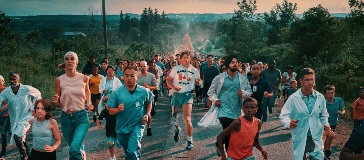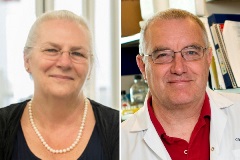Cancer patients and survivors to play a growing role in the Team Canada of Cancer Research

Cancer patients and survivors and their caregivers and families will play an increasingly bigger role in shaping the Marathon of Hope Cancer Centres Network with the creation and official launch of the MOHCCN Patient Working Group. This new group, which has been working together since May, brings over 30 new members from 9 provinces to our growing Team Canada of Cancer Research.
“Since the Network was first envisioned nearly a decade ago, it was always understood that we needed it to be truly representative of Canada and that cancer patients, survivors and their families would play a central role in shaping and growing it,” says Dr. André Veillette, Network executive director. “We are extremely happy that so many talented, experienced and passionate individuals want to participate and share their much-needed experience.”
The working group is co-chaired by Drs. Nicole Beauchemin and Nathalie Lamarche-Vane, both of whom are renowned cancer researchers, and who are also cancer survivors. Under their leadership, the group will interact with researchers, oncologists, administrators and data scientists to ensure that, as Network members work towards accelerating precision medicine for cancer, they never forget the main goal: improving the well-being of cancer patients and their families.
“Cancer patients are the ultimate recipients of precision oncology, which is why we believe it is important that as a group, we work with other Network members to make sure that our concerns and questions are known, and that our voices are heard,” say Drs. Beauchemin and Lamarche-Vane.
Because so many patients applied to participate, the working group has been divided into four focus groups to better achieve its goals. These groups are working on specific tasks, including:
- incorporating patients as collaborators and participants in the medical team;
- building a nation-wide education campaign on precision oncology;
- communicating patient journeys and experiences; and
- developing patient engagement and learning workshops delivered through MOHCCN meetings.
“By bringing together cancer patients and survivors from across Canada to actively participate with scientists and clinicians, this group is formulating how precision oncology is being developed in Canada and using their experience to help shape what a patient’s journey with precision medicine may look like,” say Drs. Beauchemin and Lamarche-Vane. “It is already clear, from the few meetings held so far, that this highly competent group has ‘hit the ground running’ and are enjoying working together towards a common goal.”
Remarks from members of this working group:
“Who can better shape the future of cancer treatment than those living with it? I can’t think of anyone with more to gain or lose than patients. Our lives and those of the 40% of Canadians who will be diagnosed with cancer in their lifetime are at stake. Precision medicine uses the patient’s genetic profile to offer the most effective treatment to them. It’s the gateway to finding a cure. It’s exactly what Terry wanted.” – Natalie A., PWG member and terminal cancer patient
“I joined the MOHCCN Patient Working Group because I have been very lucky to be receiving treatment through personalized medicine. However, these technologies are not accessible to many Canadians. I’d like to help however I can with the establishment of this exciting research initiative, so that Canada can be in the forefront of precision medicine research and treatments. Such global leadership will result in significant impact for all Canadians.” – Yuan L., PWG member and Lung cancer patient
“During my 2015 cancer journey, I was empowered to work collaboratively with my care team and advocate for myself in what became a very personalized care plan. I was lucky to be able to do this, not only because my background as a nurse gave me some knowledge on the issue, but because I know that not all patients have the same cancer journey, as emotional, physical, medical and spiritual needs can vary. With my clinical background and patient experience, I am adding valuable insights on how to work cohesively with a care team to make changes that take a patient’s need into account.” – Debbie D., PWG member and breast cancer survivor
“Many survivors of a cancer diagnosis look for ways to give back to their community in a meaningful way. The MOHCCN Patient Working Group allows me to do that and represent those who cannot do so. The work we do can help pave the way for patient focused treatments that engages our mind and body in our own treatment plan.”– Randy T., PWG member and cancer patient
“It is very important that patients be an active part in shaping this precision medicine Network simply because patients are the ones undergoing or who have undergone the treatments. If we are concerned about moving precision medicine forward, then the people who stand to benefit from it should be an active part of the work. The MOHCCN is about bringing people together to find a cure or cures. Oncologists, researchers, fundraising partners are already working together. I believe patients could play a key role in the partnership. This is why I joined the program, as well as to understand where the work is going and to be able to share it with individuals that I’m in contact with that support cancer research through the Terry Fox Foundation.” – Darrin P., PWG member and brain cancer survivor
Cancer patients are the ultimate recipients of precision oncology, which is why we believe it is important that as a group, we work with other Network members to make sure that our concerns and questions are known, and that our voices are heard.
Related Team Members
-
André
Executive Director
Veillette -
Nathalie
MOHCCN Steering CommitteeWorking Group Chair
Lamarche-Vane
Related News
-

An incredible milestone! A letter from Dr. André Veillette
Today, we’re proud to announce that we’ve reached our initial goal of sequencing 15,000 cancer genomes. -

Marathon of Hope Cancer Centres Network launches its 2026 Health Informatics & Data Science Award competition
The Marathon of Hope Cancer Centres Network is excited to announce the launch of its 2026 funding competition for early career health informaticians and data scientists. -

Marathon of Hope Cancer Centres Network achieves goal of sequencing 15,000 genomes for game-changing cancer dataset
The Marathon of Hope Cancer Centres Network (MOHCCN), a pan-Canadian initiative led by the Terry Fox Research Institute and the Terry Fox Foundation, today announced that it had achieved its goal of s... -

Long-time Terry Fox-funded researchers, leaders and mentors Drs. Anne-Marie Mes-Masson and John Bell appointed to the Order of Canada
Drs. Anne-Marie Mes-Masson and John Bell, two distinguished researchers with deep and long-time connections to the Terry Fox Research Institute, have been appointed to the Order of Canada, one of the ...
